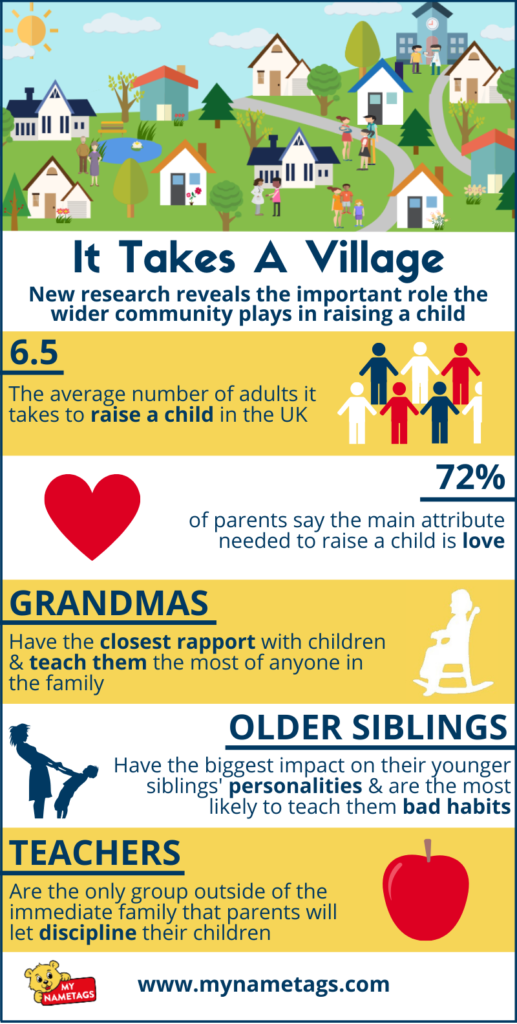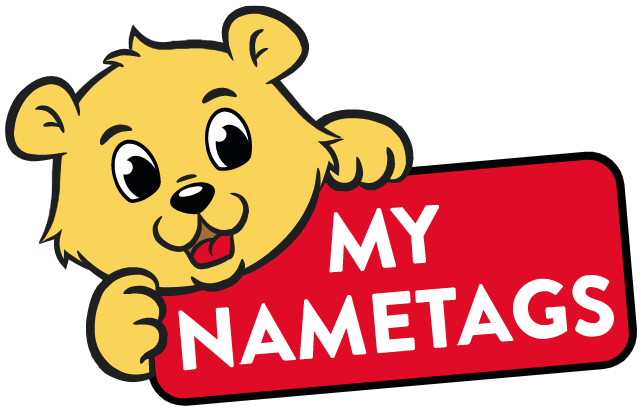
At My Nametags, we know that raising a child is no easy task for parents. After noticing a range of family members ordering name labels for children in recent years, we were intrigued to find out how many people are involved in a child’s life in the UK and whether the proverb, ‘it takes a village to raise a child’, rings true for families across Britain.
So, we surveyed 2,000 mums, dads, and children in the UK to find out more about their support network and delve deeper into the role that the wider community plays in the upbringing of a child.
The results
Our research found that it takes, on average, an astonishing 6.5 adults to raise a single child in the UK, demonstrating the huge role that those outside of the immediate family unit play when it comes to bringing up a child.
In addition, a quarter of parents agree that it can take as many as 10 people to raise a child, with the majority stating that the main attribute needed to be involved in a child’s upbringing is love. In fact, this ranked even higher than being related to the child or regularly looking after them.
The role of the wider community
Our research also revealed the different roles that the wider community plays when bringing up a child in the UK. Grandparents were found to be a key pillar in parents’ support systems and are heavily relied upon for childcare, with almost half of parents relying on grandmothers to babysit whilst parents are at work, and quarter regularly calling upon grandfathers. In addition, grandmothers are believed to have the closest rapport with children, as well as teaching them more than anyone else in the family.
We also found that older siblings have a significant influence over children, with a quarter saying they have the most influence over their child’s bad habits and 16 percent of parents agreeing they have the biggest impact on their personalities. Children also agree, with a fifth stating they have the most fun with their older siblings.
Interestingly though, despite this village mentality, it is often only teachers that parents are happy to let discipline their child outside of the family unit, according to our research.
What the experts say
Commenting on the findings, Bea Marshall, Parenting Expert and Founder of Yes Parenting, said, “Humans are generally social creatures who thrive in communal and cooperative environments. Nowadays it is common for families to live away from their extended families and without the day to day support of their immediate neighbours. However, it is still so important for families to create a network of support as they raise their children.
“When other people help care for children, it provides parents with an opportunity to recharge, work or play. Those other people also give children a secure set of relationships in which their needs for connection, safety, and belonging are met. Children have an opportunity to learn from the different people around them and they receive different things from each person – one may be more playful, another more nurturing, for example. Each person in a child’s life contributes something unique that helps them to grow into a well-rounded individual, while offering crucial support to their parents.”
The impact of COVID-19 on parents
The current global situation is also presenting families with new and unfamiliar challenges. With some schools and nurseries remaining closed and social distancing measures still in place, parents are unable to rely on the wider community as they usually would. As a result, they must take on a host of new roles, becoming their child’s teacher, sports coach, best friend, confidant, and everything in between.
To get a clearer understanding of how this time is affecting families across Britain, we spoke to Zoe Vernon, mum to Jess, aged 4. Commenting on the impact of the current restrictions on family life, Zoe said, “I am usually at work during the week so my daughter spends a lot of time with our child minder who picks her up from nursery four times a week, so it’s strange for her not see her. She really misses spending time playing with my younger sister too, and she can’t wait to get back to her swimming lessons.
“For me, I felt really anxious at the beginning because of all the changes. Now we have a bit of a routine which has certainly helped, and it has been nice to have the opportunity to take on teaching and the extra roles I wouldn’t normally do.”
Conclusion
Although every household will have their own approach to parenting, it has been interesting to see how important the wider community is to parents when raising a child in the UK, and how each individual helps to shape a child’s life.
With the effects of COVID-19 continuing to impact our everyday lives and routines, it has been particularly interesting to speak to parents about their experiences and how they are adapting to the situation. We found that, although parents and children have found new ways of living during the crisis, they are keen to get back to their normal routine as soon as possible, suggesting that this unusual time in history has only reinforced the importance of including the wider community in the upbringing of a child.
Let us know what you think of the research! Tweet @MyNametags or visit our Facebook page to join the conversation.


